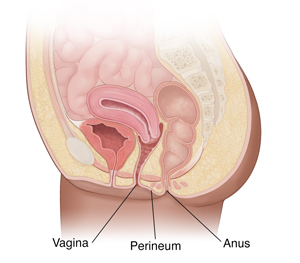Fecal incontinence is when you accidentally leak stool. It often occurs after vaginal birth. It can be embarrassing and distressing, but it can be treated. Bowel control often comes back after your body has had time to heal from pregnancy and childbirth.
What causes loss of bowel control during and after pregnancy?
Loss of bowel control most often occurs from vaginal birth. Sometimes the area between your vagina and anus (perineum) tears during childbirth. In other cases, your healthcare provider may make a cut in this tissue (episiotomy). This is to help the baby’s head move through the vagina. The pressure and stress of vaginal birth can also injure your anal sphincter. This is the ring of muscle that controls when your anus opens and closes.
Other things can raise your risk for urinary incontinence after birth. They include:
-
Being an older mom
-
Weighing too much (obesity)
-
Having a larger baby
-
Having a longer labor
-
Using forceps or vacuum extraction during birth
Symptoms of fecal incontinence after birth
Symptoms include:
-
Urgent need to have a bowel movement
-
Leaking gas or stool
-
Diarrhea
-
Constipation
Treatment for fecal incontinence after pregnancy
Treatments include:
-
Changes to your diet. This includes not using artificial sweeteners. It also includes not having caffeine, dairy products, alcohol, or spicy or fatty foods.
-
Bowel retraining. This is having bowel movements at scheduled times.
-
Skin care. This might include using special medicines to protect your skin.
-
Hygiene. This includes using deodorants, pads, and gentle soaps and wipes.
Medical treatments:
-
Medicines, such as those that stop diarrhea
-
Biofeedback. For this, the healthcare provider puts sensors in and outside your anus. They help you learn how to find and strengthen the anal sphincter muscles.
-
Pelvic floor muscle therapy. This includes Kegel exercises.
-
Surgery to fix the anal sphincter
-
Sacral nerve stimulation. For this treatment, your healthcare provider puts in a small device under your skin. It sends a signal to the nerve that controls the bowels.
-
Bulking products, such as psyllium
-
Injection of a substance into the tissues around the anus. This helps tighten the anal opening.
-
Anal plugs
When to call your healthcare provider
Call your healthcare provider if you have new symptoms or if symptoms get worse.


